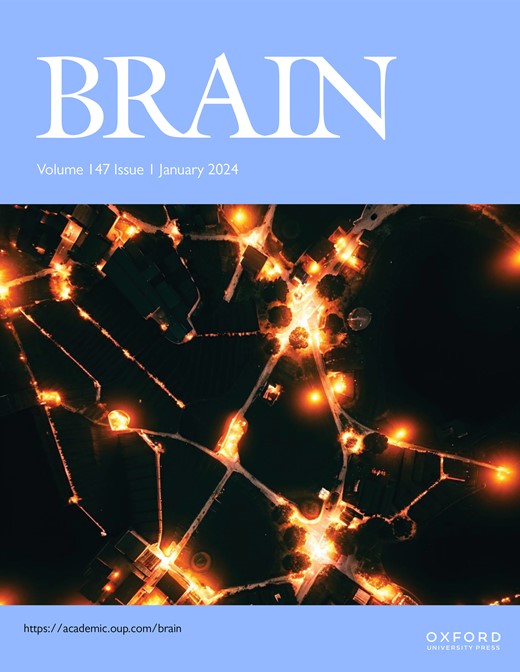Decision cost hypersensitivity underlies Huntington’s disease apathy
IF 10.6
1区 医学
Q1 CLINICAL NEUROLOGY
引用次数: 0
Abstract
The neuropsychiatric syndrome of apathy is now recognized to be a common and disabling condition in Huntington’s disease (HD). However, the mechanisms underlying it are poorly understood. One way to investigate apathy is to utilise a theoretical framework of normal motivated behaviour, to determine where breakdown has occurred in people with this behavioural disruption. A fundamental computation underlying motivated, goal-directed behaviour across species is weighing up the costs and rewards associated with actions. Here, we asked whether people with apathy are more sensitive to costs of actions (physical effort and time delay), less sensitive to rewarding outcomes, or both. Based on the unique anatomical substrates associated with HD pathology, we hypothesised that a general hypersensitivity to costs would underpin HD apathy. Genetically confirmed carriers of the expanded Huntingtin gene (premanifest to mild motor manifest disease (n=53) were compared to healthy controls (n = 38). Participants performed a physical effort-based decision-making task (Apple Gathering Task) and a delay discounting task (Money Choice Questionnaire). Choice data was analysed using linear regression and drift diffusion models that also accounted for the time taken to make decisions. Apathetic people with HD accepted fewer offers overall on the Apple Gathering Task, specifically driven by increased sensitivity to physical effort costs, and not explained by motor severity, mood, cognition, or medication. Drift diffusion modelling provided further evidence of effort hypersensitivity, with apathy associated with a faster drift rate towards rejecting offers as a function of varying effort. Increased delay sensitivity was also associated with apathy, both when analysing raw choice and also drift rate, where there was moderate evidence of HD apathy drifting faster towards the immediately available (low cost) option. Furthermore, the effort and delay sensitivity parameters from these tasks were positively correlated. The results demonstrate a clear mechanism for apathy in HD, cost hypersensitivity, which manifests in both the effort and time costs associated with actions towards rewarding goals. This suggests that HD pathology may cause a domain-general disruption of cost processing, which is distinct to apathy occurrence in other brain disorders, and may require different therapeutic approaches.亨廷顿病冷漠症的决策成本超敏性基础
冷漠这一神经精神综合征现已被认为是亨廷顿氏病(HD)中一种常见的致残性疾病。然而,人们对其发病机制却知之甚少。研究冷漠症的一种方法是利用正常动机行为的理论框架,确定这种行为障碍患者的行为在哪些方面出现了中断。权衡与行动相关的成本和回报是物种间动机、目标导向行为的基本计算方法。在这里,我们要问的是,冷漠症患者是否对行动的成本(体力付出和时间延迟)更敏感,对奖励结果更不敏感,或者两者兼而有之。基于与 HD 病理相关的独特解剖基质,我们假设,对成本的普遍超敏反应将成为 HD 冷漠症的基础。我们将经基因证实的亨廷汀基因扩增携带者(显性前至轻度运动显性疾病)(53 人)与健康对照组(38 人)进行了比较。参与者进行了一项基于体力的决策任务(苹果收集任务)和一项延迟贴现任务(金钱选择问卷)。我们使用线性回归和漂移扩散模型对选择数据进行了分析,这些模型还考虑了做出决策所需的时间。在 "苹果收集任务 "中,冷漠的 HD 患者总体上接受的提议较少,这主要是由于他们对体力付出成本的敏感度增加所致,而运动严重程度、情绪、认知能力或药物等因素则无法解释这一现象。漂移扩散模型进一步证明了对努力的敏感性,冷漠与拒绝提议的漂移率更快有关,这是努力程度不同的函数。在分析原始选择和漂移率时,延迟敏感性的增加也与冷漠有关,有中等程度的证据表明,高清冷漠会更快地转向立即可用(低成本)的选项。此外,这些任务的努力和延迟敏感性参数呈正相关。研究结果表明,HD 患者的冷漠有一个明确的机制,即成本超敏,这表现在与实现有回报目标的行动相关的努力和时间成本上。这表明,HD 的病理变化可能会导致成本处理的领域性破坏,这与其他脑部疾病中出现的冷漠不同,可能需要不同的治疗方法。
本文章由计算机程序翻译,如有差异,请以英文原文为准。
求助全文
约1分钟内获得全文
求助全文
来源期刊

Brain
医学-临床神经学
CiteScore
20.30
自引率
4.10%
发文量
458
审稿时长
3-6 weeks
期刊介绍:
Brain, a journal focused on clinical neurology and translational neuroscience, has been publishing landmark papers since 1878. The journal aims to expand its scope by including studies that shed light on disease mechanisms and conducting innovative clinical trials for brain disorders. With a wide range of topics covered, the Editorial Board represents the international readership and diverse coverage of the journal. Accepted articles are promptly posted online, typically within a few weeks of acceptance. As of 2022, Brain holds an impressive impact factor of 14.5, according to the Journal Citation Reports.
文献相关原料
| 公司名称 | 产品信息 | 采购帮参考价格 |
|---|
 求助内容:
求助内容: 应助结果提醒方式:
应助结果提醒方式:


